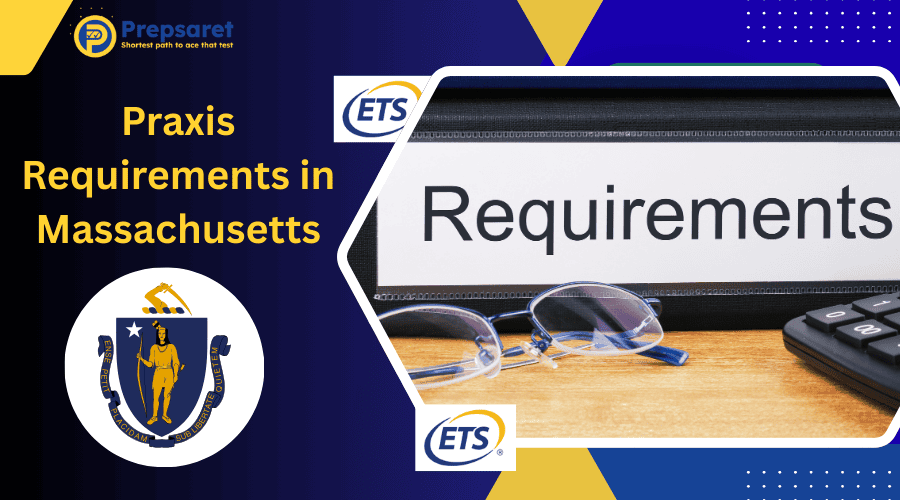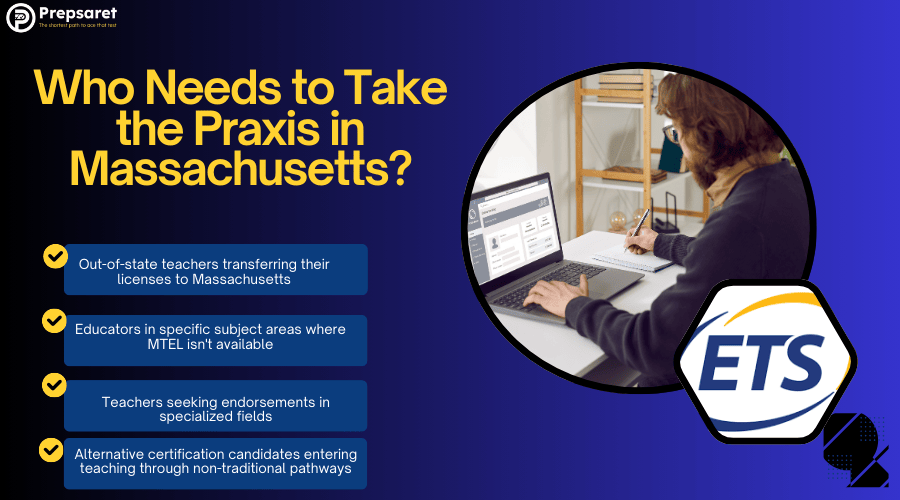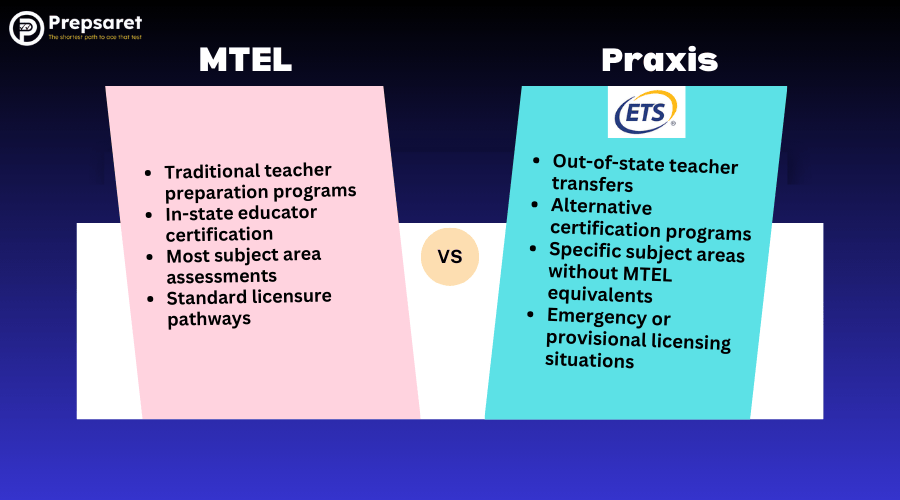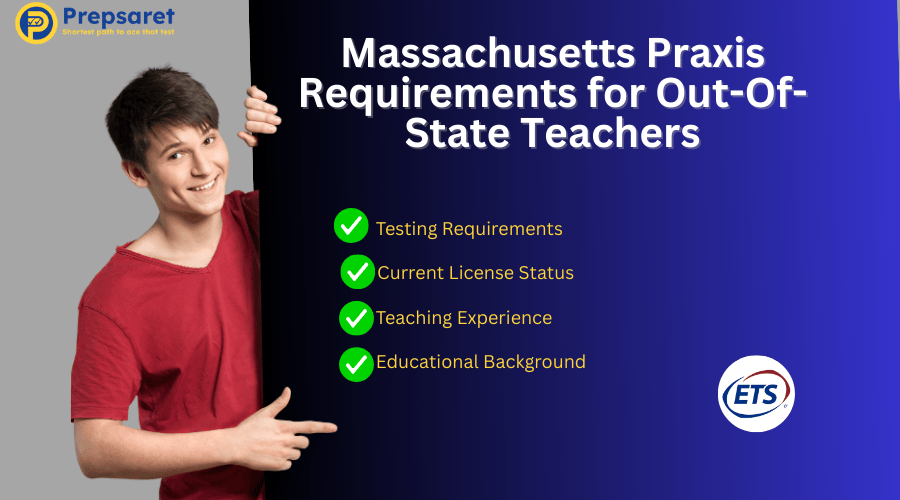Getting your teaching license in Massachusetts involves understanding the Praxis requirements in Massachusetts and how they fit into the state’s educator certification process.
Whether you’re a new teacher or transitioning from another state, passing the required Praxis exams is a crucial step toward obtaining your Massachusetts teacher certification.
This comprehensive guide covers everything you need to know about Massachusetts Praxis test requirements, scoring, registration, and preparation strategies. At Prepsaret, we provide the most accurate practice tests and exam materials to help you succeed on your first attempt.
Who Needs to Take the Praxis in Massachusetts?
Understanding who must meet the Praxis Requirements in Massachusetts is essential for aspiring educators. The state requires specific groups of teachers to take Praxis exams as part of their MA teacher certification requirements, especially those seeking out-of-state teacher certification reciprocity.
Educators Required to Take Praxis Tests
Teachers seeking Educator Licensure Massachusetts in the following areas typically need to complete Praxis assessments:
- Out-of-state teachers transferring their licenses to Massachusetts
- Alternative certification candidates entering teaching through non-traditional pathways
- Educators in specific subject areas where MTEL isn’t available
- Teachers seeking endorsements in specialized fields
The education licensure requirements vary depending on your teaching level and subject area. Most traditional teacher preparation programs in Massachusetts use the Massachusetts Tests for Educator Licensure (MTEL) instead of Praxis. However, certain circumstances require teacher licensure exams through the Praxis system.
Exemptions from Praxis Requirements
Some applicants may be exempt from the Praxis Requirements in Massachusetts if they meet certain conditions, such as:
- Holding a valid out-of-state license in good standing
- Completing an approved Massachusetts preparation program
- Qualifying under a formal reciprocity agreement
- Receiving emergency licensure due to staffing shortages
What Praxis Tests Are Required in Massachusetts?
The Massachusetts Praxis test requirements depend on your teaching area and certification pathway. Understanding which exams you need is crucial for planning your preparation strategy.
If you’re planning to take a Praxis exam Massachusetts educators may be required to complete, it’s important to verify which specific assessments align with your license type.
Core Academic Skills for Educators (Praxis Core)
The Praxis Core evaluates fundamental skills in:
- Reading (5713) – Comprehension and analysis abilities
- Writing (5723) – Communication and composition skills
- Mathematics (5733) – Problem-solving and mathematical reasoning
This teacher certification exam serves as a basic skills assessment for educator candidates who don’t have alternative demonstration methods.
Praxis Subject Assessments
Subject assessments for teachers cover specific content areas and teaching methodologies. These exams align with national teaching standards and evaluate both content knowledge and pedagogical understanding.
Popular subject areas include:
- Elementary Education
- Secondary Mathematics
- English Language Arts
- Science specializations
- Special Education
- World Languages
Massachusetts teacher testing requirements by subject
Different teaching positions have varying assessment needs. Elementary teachers typically take broader content exams, while secondary educators focus on subject-specific assessments. Special education teachers often need multiple exams covering both general and specialized content.
MTEL vs Praxis
The relationship between MTEL vs Praxis often confuses teacher candidates in Massachusetts. Both serve as teacher certification exams, but they’re used in different contexts within the state’s licensing system.
When MTEL is Used
Massachusetts primarily uses MTEL for:
- Traditional teacher preparation programs
- In-state educator certification
- Most subject area assessments
- Standard licensure pathways
When Praxis is Required
Praxis Requirements in Massachusetts typically apply to:
- Out-of-state teacher transfers
- Alternative certification programs
- Specific subject areas without MTEL equivalents
- Emergency or provisional licensing situations
Key Differences Between the Exams
| Aspect | MTEL | Praxis |
| Primary Use | In-state programs | Out-of-state/Alternative |
| Content Focus | Massachusetts standards | National standards |
| Registration | Pearson VUE | ETS |
| Score Validity | Massachusetts only | Multiple states |
Understanding these distinctions ensures you pursue the correct test according to your license path and helps you better prepare for the Praxis Requirements in Massachusetts where applicable.
Praxis Scores in Massachusetts
Praxis scores Massachusetts accepts vary by exam type and subject area. Understanding the scoring system and requirements ensures you’re properly prepared for success.
Praxis Scoring in Massachusetts
Praxis passing scores Massachusetts uses a scaled scoring system:
- Praxis Core: Each subtest scored separately (100-200 scale)
- Subject Assessments: Varies by content area (100-200 scale)
- Performance Assessments: Holistic scoring rubrics
Praxis Specific Score Requirements
The passing score for Praxis Core in Massachusetts and subject assessments include:
Praxis Core Requirements
- Reading: 156
- Writing: 162
- Mathematics: 150
Subject Assessment Scores
- Elementary Education: 150
- Secondary Mathematics: 160
- English Language Arts: 162
- Special Education: 155
Praxis Score Reports and Interpretation
Praxis scores needed for teacher certification in Massachusetts are clearly outlined in your official score report. ETS provides detailed performance information including:
- Overall scaled scores
- Performance by content categories
- Comparison to passing standards
- Recommendations for improvement
Find Out: How Praxis Scoring Works
Scores are typically available within 10-16 business days for most exams, though some performance assessments may take longer.
Praxis Registration and Testing in Massachusetts
Praxis registration Massachusetts follows a straightforward process through ETS, but understanding the details ensures smooth test scheduling and administration. All exam scheduling is handled through the official ETS Praxis portal, which manages test access nationwide.
How to Register for the Praxis in Massachusetts
The process for how to register for the Praxis in Massachusetts involves these steps:
- Step 1: Create an ETS Account – Visit the official ETS Praxis website
- Step 2: Select Your Tests – Choose required exams for your certification
- Step 3: Choose Test Center – Find convenient Massachusetts locations
- Step 4:Schedule Your Date – Select from available testing windows
- Step 5: Pay Testing Fees – Complete registration with payment
Praxis Testing Centers in Massachusetts
Testing locations throughout Massachusetts include:
- Boston Metro Area – Multiple locations including Cambridge and Quincy
- Worcester Region – Central Massachusetts options
- Springfield Area – Western Massachusetts accessibility
- Additional Locations – Scattered throughout the state for convenience
Praxis Registration Tips for Massachusetts Educators
- Register early for preferred dates and locations
- Verify identification requirements before test day
- Understand cancellation and rescheduling policies
- Prepare for testing center security procedures
- Confirm your registration details via email
Following these steps carefully ensures you stay aligned with all Praxis Requirements in Massachusetts and avoid delays in your certification process.
Check Out: How Long Do Praxis Scores Take?
Alternative Licensure and Praxis Requirements in Massachusetts
Alternative licensure in Massachusetts provides pathways for career changers and professionals transitioning into education. These programs often incorporate Praxis requirements alongside other certification components.
Alternative Certification Programs
Massachusetts offers several alternative routes to teaching:
- Master of Arts in Teaching (MAT) programs
- Professional development and support programs
- District-based alternative certification
- Emergency licensing pathways
These options are designed for individuals who may not have completed a traditional teacher prep program but bring valuable experience or subject knowledge.
Praxis Requirements in Massachusetts Alternative Certification
Many alternative certification programs include Praxis in Massachusetts as part of the eligibility or licensure process. Typical exam components may include:
- Praxis Core – Assesses basic reading, writing, and math skills
- Praxis Subject Assessments – Verifies content area knowledge
- Teaching performance assessments – Evaluate instructional effectiveness
- Additional state-specific exams or training modules
Meeting these Praxis requirements ensures that educators entering through alternative pathways still meet rigorous professional standards.
Steps to Get Your Initial Teaching License in Massachusetts (via Praxis Pathway)
To earn your initial teaching license MA through an alternative route, follow these steps:
- Step 1: Program Enrollment – Complete an approved alternative certification program
- Step 2: Testing Requirements – Pass required Praxis or MTEL exams
- Step 3: Teaching Experience – Fulfill supervised practicum or classroom teaching hours
- Step 4: Application Submission – Apply via the Massachusetts ELAR licensing system
- Step 5: License Issuance – Receive your official state-issued initial teaching license
Massachusetts Praxis Requirements for Out-Of-State Teachers
Massachusetts Praxis requirements for out-of-state teachers vary based on factors such as current licensure, subject area, and whether reciprocity applies. Understanding the out-of-state teacher certification process is crucial for a smooth transition.
Praxis and License Transfer Reciprocity in Massachusetts
Out-of-state certification transfers are reviewed on a case-by-case basis. Key considerations include:
- Current License Status – Whether your license is valid, expired, or suspended.
- Teaching Experience – Number of years in a certified teaching role
- Educational Background – Accreditation of your teacher prep program
- Testing Requirements – Whether previous exam scores and Massachusetts align
Massachusetts may require Praxis scores if your existing exams are not considered equivalent to MTEL.
When Praxis is Required for Out-of-State Teachers
You may need to meet Praxis Requirements in Massachusetts if:
- Your previous state used different testing requirements
- Your license has been expired for an extended period
- You’re changing teaching levels or subject areas
- Massachusetts doesn’t have reciprocity with your previous state
Getting a Massachusetts Teaching License Without Praxis
Some out-of-state educators may obtain a Massachusetts teaching license without Praxis under specific conditions, such as:
- Full out-of-state teacher certification reciprocity agreements
- Comparable testing recognition (MTEL equivalency)
- Experience-based waivers for veteran teachers
- Emergency licensing provisions during teacher shortages
Steps to Transfer Your Out-of-State License to Massachusetts
Here’s how to begin the transfer process:
- Verify Eligibility – Check Massachusetts reciprocity agreements
- Gather Documentation – Collect transcripts, licenses, and experience records
- Submit Application – Use Massachusetts ELAR system
- Complete Testing – Take required Praxis or MTEL exams if needed
- Await Review – Allow processing time for application evaluation
Massachusetts Department of Education and Praxis Testing Requirements
The Massachusetts Department of Education Praxis policies and educator testing requirements are established through comprehensive regulations and guidelines.
Role of the Massachusetts Department of Education in Praxis Testing
The Massachusetts Department of Elementary and Secondary Education (DESE) oversees:
- Testing Policy Development – Establishing exam requirements and standards
- License Application Review – Processing certification applications
- Reciprocity Agreements – Negotiating interstate license recognition
- Continuing Education Requirements – Maintaining professional development standards
How to Access Official Praxis Requirements in Massachusetts
To find the most current Massachusetts Department of Education Praxis requirements, use these resources:
- Visit the official DESE website (doe.mass.gov)
- Review educator licensing regulations and Praxis guidelines
- Contact the Office of Educator Licensure for clarification
- Consult with approved preparation programs advisor
Stay Informed About Changes to Testing Requirements
Educator testing requirements can change, keep up-to-date by:
- Subscribing to DESE licensing and policy email updates
- Following DESE on social media platforms
- Participating in regional training or professional development
- Consulting your licensure program or educational organizations
Praxis Preparation Strategies and Resources in Massachusetts
Successfully meeting Praxis Requirements in Massachusetts takes more than just content knowledge—it requires the right strategy and dependable resources designed to reflect the actual exam experience.
Recommended Study Approaches
- Diagnostic Testing – Begin your study plan by identifying strengths and weaknesses. This helps target your review efforts and avoids wasting time on topics you’ve already mastered.
- Content Review – Use focused content review sessions to bridge knowledge gaps, especially in your subject-specific areas, where deep understanding is essential for passing Praxis exams.
- Practice Testing – Take full-length practice tests regularly. Simulating test-day conditions builds confidence, reveals pacing issues, and familiarizes you with the Praxis question formats.
- Time Management – Develop a realistic study schedule and stick to it. Allocate more time to difficult sections while still reinforcing your strengths. Don’t overlook the importance of rest and review cycles.
Top Quality Praxis Preparation Resources
- Prepsaret – At Prepsaret, we offer the most comprehensive and realistic Praxis practice tests available. Our exams are designed to mirror the actual testing format, content, and difficulty level, helping you build confidence, strengthen weak areas, and walk into the exam fully prepared.
- ETS Official Materials – The Educational Testing Service (ETS) offers official Praxis study guides, practice tests, and exam outlines. These materials are directly aligned with the test’s structure and are ideal for understanding how questions are presented and scored.
- State University Resources – Many Massachusetts-based universities, including those in the UMass system, offer Praxis test prep workshops, online modules, and study groups through their education departments or testing centers. These resources often align with state-specific licensure pathways.
- Professional Organizations – Subject-area associations such as the National Council of Teachers of Mathematics or the National Science Teaching Association offer test prep materials, study communities, and webinars. These resources often provide insight into current Praxis test trends and classroom relevance.
Continue Reading: Best Praxis Study Resources
Praxis Requirements in Massachusetts: FAQs
Can I Just Take the Praxis Without an Education Degree?
Yes, you can take the Praxis without holding an education degree. Some alternative pathways in Massachusetts allow testing prior to completing full educator preparation, especially if you're pursuing certification through experience or an approved licensure program.
What Do I Need for the Praxis?
To take the Praxis, you need a valid ETS account, proper government-issued ID, and payment for test fees. Bring printed admission tickets and prepare for security procedures. Review all testing requirements beforehand on the official ETS Praxis website.
What Are the Requirements To Be a Teacher in Massachusetts?
You must complete a bachelor’s degree, pass the required MTEL or Praxis exams, complete a state-approved educator preparation program, and apply through the Massachusetts ELAR system. Some pathways may also include teaching experience or supervised practicum.
What States Don’t Require Praxis To Teach?
States like California, Texas, and New York do not use the Praxis series for certification. Instead, they have their own state-specific teacher exams such as CSET, TExES, or NYSTCE. Always confirm requirements with the state education agency.
What Standardized Test Does Massachusetts Use?
Massachusetts primarily uses the MTEL (Massachusetts Tests for Educator Licensure) to evaluate teaching candidates. However, Praxis exams are accepted in some licensure pathways, particularly for out-of-state teachers or alternative program candidates.
Which Praxis Exams Are Required in Massachusetts?
Massachusetts may require Praxis Core for basic skills and Praxis Subject Assessments depending on your licensure area. These are typically required for out-of-state teachers or those in alternative licensure programs. Check specific requirements with DESE.
Is the Praxis Required for MA Elementary Education License
No, the MTEL is typically required for elementary education licensure in Massachusetts. However, if you're applying from another state or through an alternative route, the Praxis may be accepted under certain conditions. Always confirm with DESE.
Praxis Requirements in Massachusetts: Final Thoughts
Understanding and meeting the Praxis Requirements in Massachusetts is essential for launching or advancing your teaching career. Whether you’re new to the field, transferring from another state, or seeking additional credentials, knowing the exam requirements early helps you plan effectively.
High-quality study resources, like those at Prepsaret, give you a competitive edge by closely matching the real exam format. Remember, these requirements help uphold strong teaching standards in Massachusetts classrooms.
By preparing strategically and thoroughly, you’re not just passing a test—you’re shaping your professional future and making a lasting impact on your students’ education.




